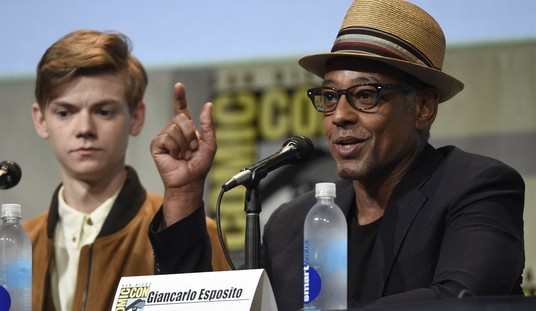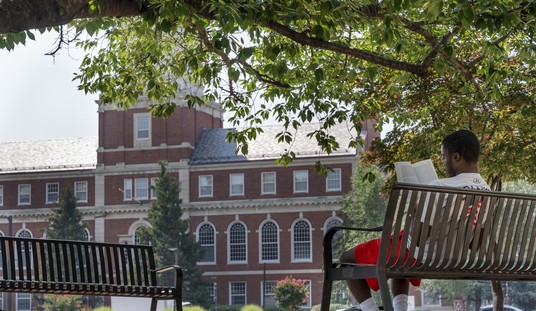Judge Peter Cahill handed prosecutors a big win a few minutes ago in the trial over George Floyd’s death in Minneapolis last year. For months, the state wanted to add a third-degree charge as a potential intermediate position for the jury, but it took a state supreme court demurral yesterday to accomplish it:
Hennepin County District Judge Peter Cahill said Thursday that he will reinstate a third-degree murder charge against the former Minneapolis police officer accused of killing George Floyd.
Chauvin, who knelt on Floyd’s neck for about nine minutes May 25, is already charged with second-degree murder, which carries a maximum sentence of 40 years, as well as second-degree manslaughter. The third-degree murder charge carries a maximum sentence of 25 years.
Cahill dismissed the charge last fall because he believed that the circumstances of Chauvin’s case did not fit, but an appellate ruling in an unrelated case provided new grounds for it days before the trial started and ordered him to reconsider.
The earlier case was the Mohammed Noor trial for shooting Justine Damond without cause. Damond had called the police about an assault taking place outsider her residence, and Noor shot her as she approached the patrol car. Prosecutors added the third-degree charge, which Noor appealed and lost at the first level. The supreme court has not yet heard the case, but their refusal to intervene allowed prosecutors and the court to treat the appellate decision as precedential:
The Minnesota Supreme Court issued a decision Wednesday that could revive a charge of third-degree murder against Derek Chauvin as attorneys in his trial seated the fifth juror who will hear testimony about the killing of George Floyd.
The state’s high court said without elaboration that it will not grant Chauvin’s request to review an appeals court ruling that said District Judge Peter Cahill improperly denied prosecutors’ motion to reinstate a third-degree murder charge against him.
Given the appellate court’s instruction to Cahill, this decision was predictable. The defense will argue that it now needs more time to prepare on the new charge. They earlier attempted to get a writ of prohibition to stop jury selection, but the courts didn’t bite on that idea either. Cahill astutely noted that the same jury is being asked to consider second-degree murder and manslaughter, so an intermediate charge shouldn’t change the calculus of jury selection. Also, intermediate charges are at least occasionally added at the end of trials without negating the jury, as Cahill also pointed out.
The impact of this will be that prosecutors have a fallback position if they can’t prove that Chauvin was committing a felony at the time of Floyd’s death. (First they have to prove a causal relationship between Chauvin’s knee on his neck and Floyd’s death for conviction on any charge.) The sentencing gap between second-degree murder and manslaughter, which would likely result in a five-year sentence, clearly has the state worried about the outcome. If Chauvin gets convicted of manslaughter rather than a murder charge, it will also likely complicate prosecutors’ efforts to try the other three officers in August.
As of this morning, jury selection seems to be going better than expected. The two sides have already agreed on five jurors — three white men, one black man and a “woman of color,” with seven more jury slots and two alternate slots left to fill. That already has Twin Cities activists unhappy about the composition of the jury:
“We need people of color on the jury, we need Black elders on the jury,” lawyer and activist Nekima Levy Armstrong said. “We need people who have a history of understanding the context for what is happening in this country.”
Jess Sundin of Twin Cities Coalition for Justice 4 Jamar said she is concerned that already three selected jurors have personal relationships with police. “To me that’s already tilted,” Sundin said. …
Levy Armstrong and Michelle Gross, of Communities United Against Police Brutality, said they worried about parallels with the trial of former St. Anthony police officer Jeronimo Yanez, acquitted in the death of Philando Castile in 2016 during a traffic stop.
Many people thought the Yanez case would be a slam dunk for a conviction, Levy Armstrong said, but the majority of the jury was white, with just two young Black people. She questioned whether she would have buckled under pressure at 18 or 19 years old.
“Would I have been able to withstand being on a jury in a complicated situation where police officers are rarely if ever charged, and be able to stand against white people who typically have the opinion that officers are there to protect and serve?” Levy Armstrong said.
“Anybody who had any sympathy for the movement for people fighting for justice, they were waived from the jury,” Gross said. “It was then that I knew there would be no conviction.”
The defense certainly can approach jury selection as it sees fit, within the law. They could have used peremptory challenges to eliminate the three white men if they felt those jurors wouldn’t give their defense a fair hearing. However, what we don’t need are jurors with axes to grind in either direction. Looking for jurors to work off of historical “context” rather than the evidence in this specific case is a recipe for injustice and an outcome in which no one will have any confidence.
Jury selection continues today, and is being streamed live:








Join the conversation as a VIP Member